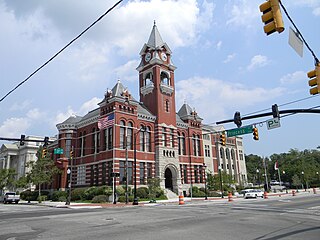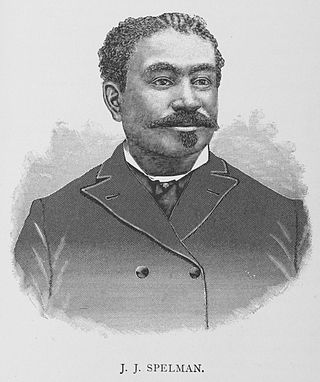Related Research Articles

New Hanover County is one of 100 counties located in the U.S. state of North Carolina. As of the 2020 census, the population was 225,702. Though the second-smallest NC county in land area, it is one of the most populous, as its county seat, Wilmington, is one of the state's largest cities. The county was created in 1729 as New Hanover Precinct and gained county status in 1739. New Hanover County is included in the Wilmington, NC Metropolitan Statistical Area, which also includes neighboring Pender County.

The United States Colored Troops (USCT) were regiments in the United States Army composed primarily of African-American (colored) soldiers, although members of other minority groups also served within the units. They were first recruited during the American Civil War, and by the end of the war in 1865, the 175 USCT regiments constituted about one-tenth of the manpower of the Union Army. About 20% of USCT soldiers died, a rate about 35% higher than that of white Union troops. Many USCT soldiers fought with distinction, with 16 receiving the Medal of Honor and numerous others receiving other honors.

From the first United States Congress in 1789 through the 116th Congress in 2020, 162 African Americans served in Congress. Meanwhile, the total number of all individuals who have served in Congress over that period is 12,348. Between 1789 and 2020, 152 have served in the House of Representatives, 9 have served in the Senate, and 1 has served in both chambers. Voting members have totaled 156, with 6 serving as delegates. Party membership has been, 131 Democrats, and 31 Republicans. While 13 members founded the Congressional Black Caucus in 1971 during the 92nd Congress, in the 116th Congress (2019-2020), 56 served, with 54 Democrats and 2 Republicans.

Hiram Rhodes Revels was an American Republican politician, minister in the African Methodist Episcopal Church, and a college administrator. Born free in North Carolina, he later lived and worked in Ohio, where he voted before the Civil War. Elected by the Mississippi legislature to the United States Senate as a Republican to represent Mississippi in 1870 and 1871 during the Reconstruction era, he was the first African American to serve in either house of the U.S. Congress.
More than 1,500 African American officeholders served during the Reconstruction era (1865–1877) and in the years after Reconstruction before white supremacy, disenfranchisement, and the Democratic Party fully reasserted control in Southern states. Historian Canter Brown Jr. noted that in some states, such as Florida, the highest number of African Americans were elected or appointed to offices after the end of Reconstruction in 1877. The following is a partial list of notable African American officeholders from the end of the Civil War until before 1900. Dates listed are the year that a term states or the range of years served if multiple terms.

Abraham H. Galloway was an American politician who served as a state Senator in North Carolina. An African American, he was a Republican.

John S. Leary was an American lawyer and politician. He was of mixed ethnicity. He is described as one of the first black lawyers in North Carolina and was a member of the state legislature from 1868 to 1870. He was an alderman in Fayetteville and later held federal government appointments. He was the first dean of the law school at Shaw University in 1890.

James J. Spelman was a journalist and politician in New York and Mississippi. His early career was as a journalist and a stage performer and manager in New York City. During the American Civil War (1861–1865), Spelman helped encourage the use of African-American soldiers, and once they were allowed, helped recruit. After the war, he moved to Mississippi where he continued his work as a journalist and served for six years in the state legislature.

Deborah Armfield "Deb" Butler is an American politician and attorney serving as a member of the North Carolina House of Representatives, where she has served since 2017. She represents the 18th House District, covering a portion of New Hanover County, as a member of the Democratic Party.
Parker David Robbins was a Union Army soldier during the American Civil War, among the first Black representatives to the North Carolina House of Representatives in 1868–1869, and inventor from Bertie County, North Carolina.
George W. Price, Jr. was a laborer, sailor, and politician in North Carolina. An African American, he served in the North Carolina House of Representatives and North Carolina Senate during the Reconstruction era.
George Lawrence Mabson was a member of the North Carolina House of Representatives and the North Carolina State Senate, as well as the North Carolina Constitutional Convention of 1875.
John Carraway was a tailor, seaman, civil rights activist, and politician in the United States. In Alabama during the Reconstruction era, he served as a delegate to the 1867 Alabama Constitutional Convention. He also served on Mobile, Alabama's city council, and in the Alabama House of Representatives.
Countelow M. Bowles was a cooper, soldier, and state legislator. He served in the Mississippi House of Representatives and Mississippi Senate. He was a Republican and African American.
Eustace Edward Green Sr. (1845-1931) was a state legislator and educator in North Carolina and a doctor in Georgia.
Edwin Legg was a delegate to the 1868 North Carolina Constitutional Convention and a state legislator in North Carolina. He represented New Hanover County and Brunswick County in the North Carolina Senate after the Reconstruction era North Carolina Constitution of 1868 was passed.
Henry Eppes was a seven-term Republican senator in the North Carolina General Assembly between 1868 and 1900. He was one of about 111 African Americans to serve in North Carolina's state legislature between 1868 to 1900 and one of the few who served during and after reconstruction. Because of Jim Crow Laws, no African American followed Eppes in the North Carolina legislature until 1968 when civil rights were restored. Eppes also served as a delegate for Halifax County to North Carolina's 1868 Constitutional Convention.
Lewis Thomas Christmas was a reverend, teacher, school principal and state legislator in North Carolina. He represented Warren County, North Carolina in the North Carolina House of Representatives from 1879 to 1880.
William Patrick Mabson, Sr., was an American educator, minister, newspaper owner, editor, and politician. He was a state legislator in North Carolina for at least two terms, active during the Reconstruction era. Mabson was one of the founders of Freedom Hill, Edgecombe County, North Carolina.
William H. Moore was a state legislator in North Carolina. He served in the North Carolina House of Representatives during the Reconstruction era. He represented New Hanover County and served with other African Americans in the state legislature. His post office was in Wilmington, North Carolina. He served with Henry Brewington and Alfred Lloyd who also represented New Hanover in the 1874-1875 session. All three were African Americans.
References
- ↑ A History of African Americans in North Carolina Division of Archives and History, North Carolina Department of Cultural Resources (1997) page 209
- ↑ House, North Carolina General Assembly (December 9, 1870). "Journal" – via Google Books.
- 1 2 3 Foner, Eric (1 August 1996). Freedom's Lawmakers: A Directory of Black Officeholders During Reconstruction. LSU Press. p. 68. ISBN 978-0-8071-2082-8 . Retrieved February 4, 2023.
- ↑ Reid, Richard M. (February 25, 2008). "Black Veterans in a Gray State". Freedom for Themselves. pp. 297–322. doi:10.5149/9780807837276_reid.12. ISBN 9780807831748 – via academic.oup.com.
- ↑ "The Banner" (PDF). The Journal of the Sons of Union Veterans of the Civil War. 112 - Number 1 (Autumn, 2007): 18. Retrieved 5 February 2023.
- 1 2 "Negro Who Attained a Coveted Position Is Laid To Rest". The Atlanta Constitution. 21 July 1901. p. 2. Retrieved 4 February 2023.

- ↑ "City Directory - Newspapers.com". Newspapers.com. Retrieved 4 February 2023.

- ↑ Smith, John David (October 12, 2005). Black Soldiers in Blue: African American Troops in the Civil War Era. Univ of North Carolina Press. ISBN 9780807875995 – via Google Books.
- ↑ "Gen. L .G. Estes resigned his seat". The Tarborough Southerner. 3 June 1869. p. 3. Retrieved 5 February 2023.

- ↑ "The Election". The Charlotte Democrat. 10 August 1869. p. 3. Retrieved 5 February 2023.

- ↑ "Election Notice - John S. W. Eagles". The Wilmington Morning Star. 26 June 1870. p. 2. Retrieved 4 February 2023.

- ↑ "On Memorial Day, Reflecting on African-American History | National Trust for Historic Preservation". savingplaces.org.
- ↑ "Taking the Census". The Weekly Star. 30 May 1890. p. 1. Retrieved 4 February 2023.
